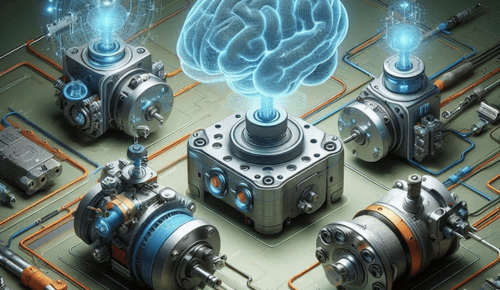Actuators are essential components in various mechanical and electronic systems, playing a vital role in converting energy into mechanical motion. This article will delve into the different types of actuators, with a focus on AV Actuators, compact electric actuators, AVA smart actuators, and valve actuators. Understanding these actuators’ functionalities and applications will help businesses and industries make informed decisions when choosing the right actuator for their systems.
What Are Actuators?
At their core, actuators are devices that convert energy, usually electrical, hydraulic, or pneumatic, into physical motion. They are crucial in industrial automation, robotics, heating, ventilation, air conditioning (HVAC), and valve control applications. Actuators are generally classified based on their power source and function, and they come in various forms such as electric, hydraulic, and pneumatic actuators.
AV Actuators: Revolutionizing Automation
AV actuators refer to actuators designed for precise and reliable control of airflow, pressure, or fluid movement. These actuators are commonly used in industries requiring precise control, such as chemical processing, pharmaceuticals, and HVAC systems. AV actuators are designed to operate seamlessly with control systems and can be integrated into both automated and manual systems.
These actuators offer numerous benefits, such as high accuracy, flexibility in integration, and energy efficiency. Furthermore, they provide better precision compared to traditional actuators, ensuring smoother system operation and better performance.
Compact Electric Actuators: Space-Saving Powerhouses
Compact electric actuators are known for their small size and high efficiency. They are ideal for applications where space is limited, yet a high level of force and precision is still required. These actuators typically operate with an electric motor and are designed to convert electrical energy into rotational or linear motion.
The main advantage of compact electric actuators is their ability to provide reliable performance without taking up much space. These actuators are commonly used in small machines, robotics, and various automated control systems. Their small footprint allows for easier integration into applications where size constraints exist, such as in medical devices, aerospace, and robotics.
Compact electric actuators can be equipped with sensors for feedback and control, allowing for better monitoring and precise adjustments. Their versatility also makes them ideal for various environments, whether they be exposed to extreme temperatures, humidity, or other harsh conditions.
AVA Smart Actuators: Intelligent Automation Solutions
AVA smart actuators represent the next generation of actuator technology, where smart features and connectivity are integrated to provide enhanced control and monitoring capabilities. These actuators come equipped with sensors, IoT (Internet of Things) capabilities, and AI-driven technology to provide real-time feedback, diagnostics, and remote control.
The integration of smart technology makes AVA smart actuators ideal for industrial automation, HVAC systems, and smart home applications. They can be monitored and controlled remotely, making them a great choice for systems requiring constant monitoring or for use in hard-to-reach environments. Additionally, these actuators can be programmed to perform specific actions automatically based on inputs or external conditions, which increases system efficiency and reduces human intervention.
The self-diagnostic feature of AVA smart actuators allows for early detection of faults or maintenance needs, preventing unexpected downtime and ensuring that operations run smoothly. Their intelligent features also help optimize energy usage and system performance, reducing costs in the long run.
Valve Actuators: Precision Control for Fluid Systems
Valve actuators are designed specifically for controlling valves in fluid, gas, or steam systems. These actuators are crucial in industries such as oil and gas, water treatment, and chemical processing, where controlling the flow of liquids or gases is essential.
A valve actuator works by converting energy into a mechanical motion that opens or closes a valve to control the flow within a pipeline or system. These actuators can be powered by electric, pneumatic, or hydraulic sources. Electric valve actuators are commonly used in environments requiring high accuracy and automation, while pneumatic and hydraulic actuators are typically employed in environments demanding higher forces.
One of the key advantages of Valve Actuators is their ability to provide precise control over the valve’s position. This level of precision is especially important in applications where the flow must be closely regulated, such as in water treatment plants, oil refineries, or chemical processing facilities.
Applications of Actuators
Actuators, particularly AV actuators, compact electric actuators, AVA smart actuators, and valve actuators, have diverse applications in several industries:
- HVAC Systems: In heating, ventilation, and air conditioning systems, actuators control dampers and valves to regulate air flow, pressure, and temperature.
- Automated Control Systems: Actuators are integral to automated systems, controlling various mechanical parts in response to sensor data and programming.
- Robotics and Manufacturing: Compact electric actuators and AVA smart actuators are widely used in robotic arms, automation lines, and precision manufacturing systems.
- Oil & Gas: Valve actuators are vital for controlling fluid flow in pipelines, storage, and processing facilities.
- Water Treatment: In water treatment plants, actuators are used to control the flow of water through filters, valves, and tanks.
Conclusion
In conclusion, actuators play an essential role in modern automation and control systems. Whether you’re looking for AV actuators for precise control, compact electric actuators for space-saving applications, AVA smart actuators for intelligent automation, or valve actuators for fluid control, there is an actuator type suited to nearly every industry and application. With advancements in actuator technology, businesses can improve their operational efficiency, reduce energy consumption, and enhance system reliability. When choosing the right actuator, understanding its capabilities and applications is key to achieving optimal performance.

